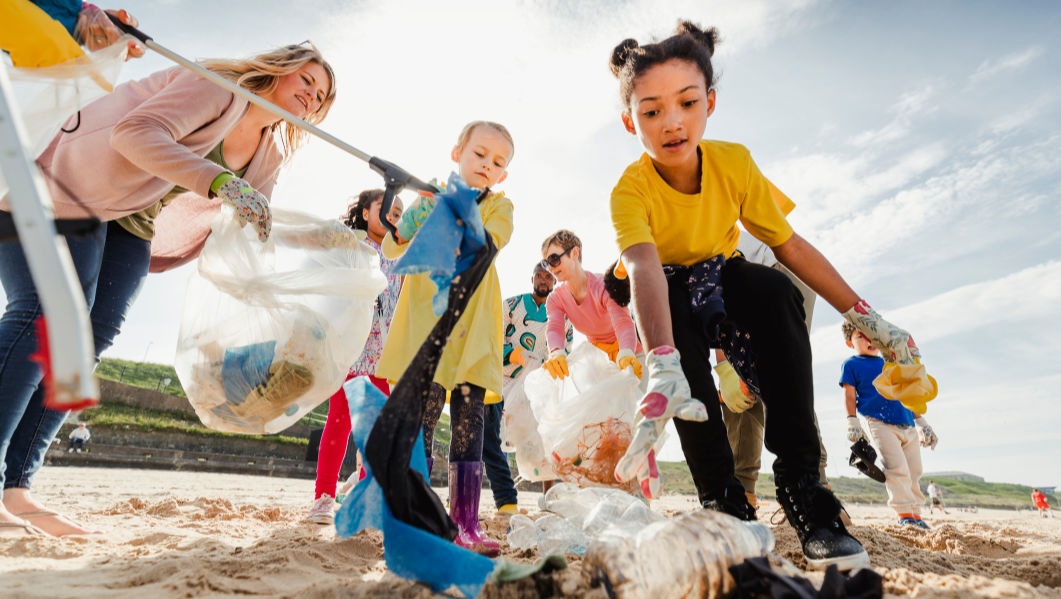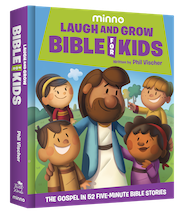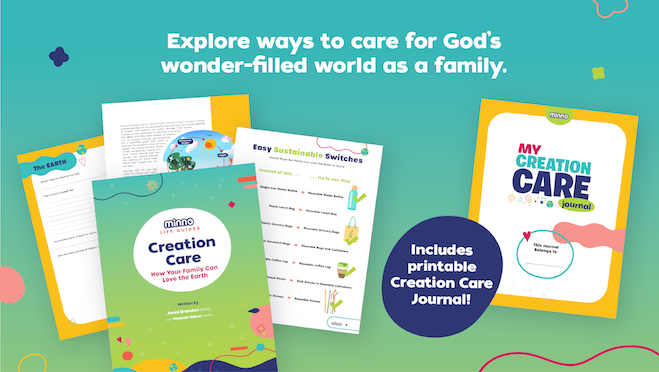Creation Care for Kids: How to Steward the Gift of Water

There are dozens of Bible verses that mention water, and water can symbolize many things in the Bible. Water, like from a spring or a well, often symbolizes refreshment and the meeting of our needs (Matthew 10:42, Psalm 23:2, John 7:37, John 4:7), and clean water often represents purity and forgiveness (Ezekiel 36:25, Ephesians 5:26), as symbolized by the sacred rite of baptism (Matthew 3:11, Mark 1:10), and when Jesus washes his disciples’ feet (John 13:5-11).
The water of nature, like lakes, rivers, and the ocean, is also often mentioned in the Bible. Many Biblical stories center around water, like when Moses parts the Red Sea, Jesus calms the storm, and the disciples pull so many fish from the Lake of Gennesaret that it breaks their nets (Luke 5:1-11). All of these stories remind us just how much Biblical culture relied on the water.
And our culture does too. For example, take a look at these facts:
- Water covers 71% of the Earth’s surface
- 40% of people on earth live within 60 miles of the sea
- More than 3 billion people rely on the ocean for their primary source of protein
- More than 90% of international trade happens by ship
Not only do we depend on the sea, but the sea depends on us too. And we are not taking care of it well. We are being bad stewards of the fish in the sea, with 80% of fisheries species being fished at full capacity or being overfished. We are bad stewards of the once-thriving coral reefs; these brilliant ecosystems, where up to 25% of the species in the ocean live and eat, are on the brink of collapse due to ocean acidification and climate change.
Symbols of our consumerism and industrialization make it into the ocean as well—
- More oil leaks into the ocean every year from leaking vehicles, oily streets, and other non-point sources than was spilled in the Exxon-Valdez Spill
- An estimated 8 million tons of plastic make it into the ocean every year
- More than 136,000 whales and seals are trapped every year in lost fishing gear
- 52% of sea turtles have eaten plastic at some point in their life, thinking it was food
This version of the ocean was not the way God intended it. Rather He created a beautiful sea “teeming with living creatures” (Genesis 1:20) and He dreams of a beautiful ecosystem in harmony, as illustrated in Ezekiel 47:9, “wherever the river goes, every living creature that swarms will live, and there will be very many fish.” Ezekiel 47 goes on to describe how fishermen live in harmony with the fish in this river, having plenty to catch in their nets, and that there will a beautiful array of different kinds of fish, or what scientists call BIODIVERSITY.
So how do we get back to this vision of an ecosystem in harmony? One like what God created, and gave to us as a gift? First, we have to remember that water is a gift. The water we drink, that refreshes and nourishes us, is a gift, and the clean water that we shower and bathe with is a gift. So too is the water found in nature. The beautiful lake we go to on vacation, the river we fish in, the ocean we learned to surf in, the delicious snowflakes we catch on our tongues, they are all gifts from our Lord, for us to savor and find delight in, but also for us to be STEWARDS of.
We must take care of water, like we take care of any precious gift, by making sure we do not fill waterways with our trash and our pollution, by making sure we do not take out more resources than they can handle giving us, and by not stressing their ecosystem beyond a breaking point with climate change. Only then can we experience this beautiful gift for many generations to come.

So how can we take care of the water we’re surrounded by?
- Care for the water body nearest you. Whether it’s a stream, lake, river, creek, or the ocean, many of us live near some body of water. And most likely, that body of water has some trash in it. Take a trip to your local lake, pond, or beach and bring a bag with you, or a bag for each member of your family. Collect trash until you have filled the bag! Talk about each piece of trash and brainstorm what reusable alternatives there could be for those plastic items, and where those items should have been disposed of. And next time you go to the beach to swim or have a picnic, don’t leave any of your own trash behind!
- Don’t dump down the storm drain. There are two paths water can take—one is the wastewater treatment system, where it goes down your sink or tub drain, leaves your house and goes to a wastewater treatment center to get treated and cleaned before it exits into a body of water. The other is the stormwater system, where when it rains, rain drains into the gutters and storm drains on the side of the road, and drains right into the local body of water without being treated. That’s why storm drains say, “Don’t dump, drains right to the ocean” on them. This is where you come in—there’s most likely a storm drain on the street you live on. It is a place for stormwater and stormwater only! Don’t dump motor oil, soap from washing your dirty car, paint, dog poop, or litter down the storm drain, unless you want that to end up in your local river, lake, or ocean!
- Use less single-use plastic. Since one of the biggest pollutants in the ocean is plastic, and most of that plastic consists of single-use items that were used for less than half an hour, by using less plastic you are helping keep God’s ocean clean. Start with easy ways to reduce your plastic footprint. Carry your own reusable bags to the grocery store, carry a reusable water bottle instead of buying plastic water bottles, get coffee in a reusable coffee cup, refuse a straw, and pack your kids’ lunches in reusable containers and lunchboxes!
- Use less of it! One of the easiest ways to take care of water is to use less of it around your house. Take shorter showers, and turn the water off while you shampoo your hair. Turn the water off while you brush your teeth, and while you soap up your dishes. All of these can make a big difference. Turning off the water while brushing your teeth saves an estimated 10 gallons per day per person, and cutting your shower by just five minutes saves another 12.5 gallons of water!
. . . . . . . . . .
Next Post in the Series: How to Protect the Air We Breathe
. . . . . . . . . .
Caring for God’s amazing creation can feel like a really big job! But you don’t have to memorize statistics, understand the latest science, or even dramatically change your lifestyle to care for the earth. Creation care can start with simple habits and just being aware . . . that God created the earth and every amazing thing in it, and that we are called to take care of His creation.
Our latest Minno Life Guide: Creation Care: How Your Family Can Love the Earth, written by Jenni Brandon, Ph.D. and Senior Scientist at Applied Ocean Sciences, will help your family discover small changes that will make a big impact on the beautiful world God made.
- Learn scientific facts about our land, air, water, plants, and animals and how they are changing for the good and not-so-good.
- Discover ways your family can make small changes to help conserve our resources.
- Engage in conversations and simple creation care practices with the ideas and prompts in this guide.
- Use the included Creation Care Journal to guide kids on a journey of exploration into the wonderful world God made and their opportunity to steward it well.
Visit the Minno Store to get your Creation Care Life Guide!
. . . . . . . . . .

Jenni Brandon received her Ph.D. in Biological Oceanography at Scripps Institution of Oceanography in December 2017, focusing on the nascent field of marine microplastics. She is an expert in quantifying and identifying marine microplastics and has developed multiple novel methods to identify the spatial and temporal ranges of microplastics and determine the age of plastics exposed to varying weathering conditions in the environment. She is passionate about the world of science communication, having given hundreds of interviews and talks to all types of stakeholders, and was a college lecturer on communicating science to the public during her post-doc at Birch Aquarium. She is active in her church and serves as a Young Life committee member in Encinitas, California. For more of her personal outreach articles and articles about her research, please check out www.jenniferabrandon.com or follow her on twitter at @PlasticsJenni.
. . . . . . . . . .
More resources and fun to get your family excited about Creation Care:
Minno Creation Care Contest
Enter to win a Creation Care prize back including a one-year subscription to Minno, a Minno reusable water bottle, and a Clive and Ian board book bundle!
Minno Shows About Creation
The Wonderful World of Science with Dr. Schniffenhousen
Minno Books about Creation

Board Books featuring beloved What’s In The Bible? brothers, Clive and Ian:

